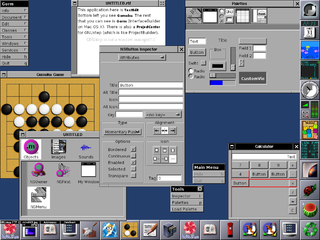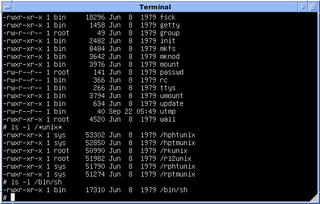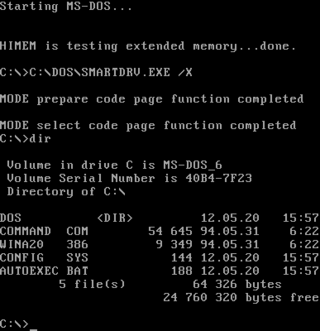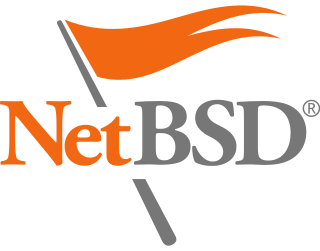Related Research Articles
C is a general-purpose computer programming language. It was created in the 1970s by Dennis Ritchie, and remains very widely used and influential. By design, C's features cleanly reflect the capabilities of the targeted CPUs. It has found lasting use in operating systems, device drivers, protocol stacks, though decreasingly for application software. C is commonly used on computer architectures that range from the largest supercomputers to the smallest microcontrollers and embedded systems.
The Portable Operating System Interface is a family of standards specified by the IEEE Computer Society for maintaining compatibility between operating systems. POSIX defines both the system and user-level application programming interfaces (APIs), along with command line shells and utility interfaces, for software compatibility (portability) with variants of Unix and other operating systems. POSIX is also a trademark of the IEEE. POSIX is intended to be used by both application and system developers.

Pascal is an imperative and procedural programming language, designed by Niklaus Wirth as a small, efficient language intended to encourage good programming practices using structured programming and data structuring. It is named in honour of the French mathematician, philosopher and physicist Blaise Pascal.

Turing is a high-level, general-purpose programming language developed in 1982 by Ric Holt and James Cordy, at University of Toronto in Ontario, Canada. It was designed in order to help students taking their first computer science course learn how to code. Turing is a descendant of Pascal, Euclid, and SP/k that features a clean syntax and precise machine-independent semantics.

A Unix shell is a command-line interpreter or shell that provides a command line user interface for Unix-like operating systems. The shell is both an interactive command language and a scripting language, and is used by the operating system to control the execution of the system using shell scripts.

GNUstep is a free software implementation of the Cocoa Objective-C frameworks, widget toolkit, and application development tools for Unix-like operating systems and Microsoft Windows. It is part of the GNU Project.

The Bourne shell (sh) is a shell command-line interpreter for computer operating systems.
An object-oriented operating system is an operating system that is designed, structured, and operated using object-oriented programming principles.

Sixth Edition Unix, also called Version 6 Unix or just V6, was the first version of the Unix operating system to see wide release outside Bell Labs. It was released in May 1975 and, like its direct predecessor, targeted the DEC PDP-11 family of minicomputers. It was superseded by Version 7 Unix in 1978/1979, although V6 systems remained in regular operation until at least 1985.

The history of Unix dates back to the mid-1960s, when the Massachusetts Institute of Technology, AT&T Bell Labs, and General Electric were jointly developing an experimental time-sharing operating system called Multics for the GE-645 mainframe. Multics introduced many innovations, but also had many problems. Bell Labs, frustrated by the size and complexity of Multics but not its aims, slowly pulled out of the project. Their last researchers to leave Multics – among them Ken Thompson, Dennis Ritchie, Doug McIlroy, and Joe Ossanna – decided to redo the work, but on a much smaller scale.
Concurrent Euclid (ConEuc) is a concurrent descendant of the Euclid programming language designed by James Cordy and Ric Holt, then at the University of Toronto, in 1980. ConEuc was designed for concurrent, high performance, highly reliable system software, such as operating systems, compilers and embedded microprocessor systems. The TUNIS operating system, a Unix variant, was implemented entirely in Concurrent Euclid. ConEuc extends a core subset of Euclid with processes and monitors as well as language constructs needed for systems programming including separate compilation, variables at absolute addresses, type converters, long integers and other features.

A computer program is said to be portable if there is very low effort required to make it run on different platforms. The pre-requirement for portability is the generalized abstraction between the application logic and system interfaces. When software with the same functionality is produced for several computing platforms, portability is the key issue for development cost reduction.
In Unix-like operating systems, a device file or special file is an interface to a device driver that appears in a file system as if it were an ordinary file. There are also special files in DOS, OS/2, and Windows. These special files allow an application program to interact with a device by using its device driver via standard input/output system calls. Using standard system calls simplifies many programming tasks, and leads to consistent user-space I/O mechanisms regardless of device features and functions.

DOS is a family of disk-based operating systems for IBM PC compatible computers. The DOS family primarily consists of Microsoft's MS-DOS and a rebranded version, IBM PC DOS, both of which were introduced in 1981. Later compatible systems from other manufacturers include DR DOS (1988), ROM-DOS (1989), PTS-DOS (1993), and FreeDOS (1998). MS-DOS dominated the IBM PC compatible market between 1981 and 1995.

A Unix-like operating system is one that behaves in a manner similar to a Unix system, although not necessarily conforming to or being certified to any version of the Single UNIX Specification. A Unix-like application is one that behaves like the corresponding Unix command or shell. Although there are general philosophies for Unix design, there is no technical standard defining the term, and opinions can differ about the degree to which a particular operating system or application is Unix-like.

Unix is a family of multitasking, multiuser computer operating systems that derive from the original AT&T Unix, whose development started in 1969 at the Bell Labs research center by Ken Thompson, Dennis Ritchie, and others.

NetBSD is a free and open-source Unix operating system based on the Berkeley Software Distribution (BSD). It was the first open-source BSD descendant officially released after 386BSD was forked. It continues to be actively developed and is available for many platforms, including servers, desktops, handheld devices, and embedded systems.

cat is a standard Unix utility that reads files sequentially, writing them to standard output. The name is derived from its function to (con)catenate files. It has been ported to a number of operating systems.
Thoth is a real-time, message passing operating system (OS) developed at the University of Waterloo in Waterloo, Ontario Canada.
References
- Ewens, P A; Holt, Richard C; Funkenhauser, M J; Blythe, D B (January 1986). "The TUNIS report: Design of a Unix-compatible operating system". Annual Progress Report. Computer Systems Research Institute, University of Toronto. ISSN 0316-6295.
- Holt, Richard C (1982). Concurrent Euclid, the Unix System and TUNIS . Addison Wesley. ISBN 978-0-201-10694-7.
- R.C. Holt (1982) TUNIS: a Unix look-alike written in concurrent Euclid (abstract). ACM SIGOPS Operating Systems Review 16(1):4--5.